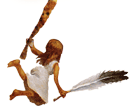








|
|
Selection Criteria
Selection Criteria for the 2004-2005 Edition of Read Up On It
- Books published in Canada or abroad of which the author or illustrator is Canadian.
- Books available from bookstores, publishers, public or school libraries.
- Books in English and/or French, with due respect given to geographic distribution and multicultural diversity.
- Books appropriate for age categories covering 2 to 16 years.
- Books from the following categories: poetry, nursery rhymes.
- Awards: fiction, non-fiction and picture books.
- Books in which the quality of text and illustration is evident, as well as the quality of the text in relation to the illustrations.
"Poetry for Children and Young Adults"* as a Theme
- A poem is a literary work that uses the rhythm and melody of language, and the combination and juxtaposition of various sounds.
- Poetry may or may not rhyme. Poetic works and poems can often be read out loud.
- Poetry uses language-based imagination and creativity; the literary genre often uses imagery, metaphors and a specific choice of words.
- Poems are often presented as a collection (series of poems written by a specific poet) or as an anthology (selection of poems written by several poets on a specific theme or presented in chronological order).
- Poetry can convey ideas, points of view or emotions. Narrative poetry can describe an event or tell a story or anecdote.
- Poetry and its various forms and literary techniques are discussed.
Nursery Rhymes and Poetic Genres Specific to Children's Literature*
- Nursery rhymes: short rhyming phrase (told or sung) to name a game or a role in a game.
- Nonsense poetry: an absurd five verse rhyming poem that follows the format a a b b a.
- Lullaby: short rhyming verse told or sung to children to put them to sleep.
- Riddle: rhyming verse that encourages curiosity or that solves a problem.
*Definitions inspired by Dictionnaire des poètes et de la poésie, by Jacques Charpentreau and Georges Jean (Paris: Gallimard, 1983) and Une cantine de comptines, by Pierre Lartigue (Paris: Les Belles Lettres, 2001).
|
